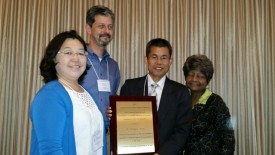
Changlu Wang.
Rutgers, New Jersey Agricultural Experiment Station (NJAES) Cooperative Extension’s Changlu Wang, associate extension specialist in urban pest management, in the Department of Entomology at Rutgers, has been honored as the recipient of the 2015 Award of Excellence from the Northeast Cooperative Extension Directors. This is the highest award presented by the directors of Extension in the northeast. It recognizes Extension outreach programming that has achieved outstanding accomplishments, results and impacts in addressing contemporary issues. Wang accepted the award at the annual Joint Northeast Summer Session on July 7, 2015.
Changlu Wang is being recognized for “Leadership, Scholarship and Innovative Programming in Urban Pest Management.” He has achieved all of the benchmarks reflective of excellence that this award recognizes. Wang is recognized as a national leader in urban pest management, secured external funding, made significant contributions to science and education and received three patents from the United Kingdom with three pending patent applications. His work in New Jersey, one of the most ethnically and religiously diverse states in the country, exemplifies his commitment to tailoring programs to meet local needs by his work with limited resource communities.
Larry Katz, director of Rutgers Cooperative Extension, commented, “We applaud his continued excellence in extension and research and look forward to learning about his next exciting innovation in urban integrated pest management.”
Wang’s innovative research program led to the invention of a series of low cost, safe, and highly effective bed bug management tools and methods. They are now adopted by the public and pest management professionals and have generated tremendous beneficial economic, social, and environmental impacts. His invention “dry ice bed bug monitor” was featured in TIME magazine in May 2010 that reached more than 3.4 million people. Most recently, his team invented a sugar-yeast bed bug monitor that is similarly effective as a bed bug monitor. Each of these home-made monitors costs about $20 compared to $450 for a commercial monitor (94% savings per trap).

Changlu with his wife Qi, Dan Lerner, chair of the Northeast Extension Directors Association and Mary Jane Willis, associate director, Rutgers Cooperative Extension.
In addition to new tools for managing bed bugs, Wang’s team also developed more cost-effective bed bug control methods and programs which have significant social and environmental impact. During 2012-2013, his team developed and implemented a model integrated pest management program in a low income housing community. The program resulted in 90% reduction in bed bug infestation within 12 months. It reduced pesticide use by > 90% compared to chemical-based bed bug control programs that were conducted in similar environments. Wang’s team collaborated with six low income communities (> 3,000 apartments) in controlling bed bug and cockroach infestations. These research and education programs resulted in > 90% reduction in pest populations. Post-treatment surveys indicated these programs significantly improved residents’ quality of life, satisfaction level to the pest management practice, and reduced pesticide applications.
Wang is considered one of the most productive researchers in urban pest management in the world. Within the last 5 years he has obtained 14 external grants from multiple sources and published three book chapters, 25 peer-reviewed journal articles, and 9 articles in trade journals. He published more papers on bed bugs than any other researcher. To date his career total number of publications is 83. Most of his publications are based on applied research which can be used immediately by the public.

